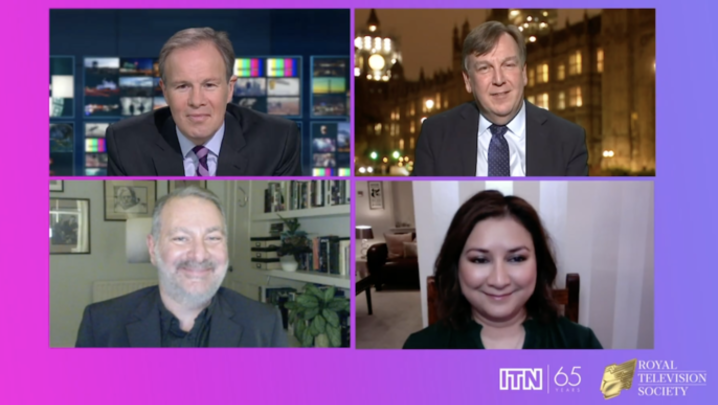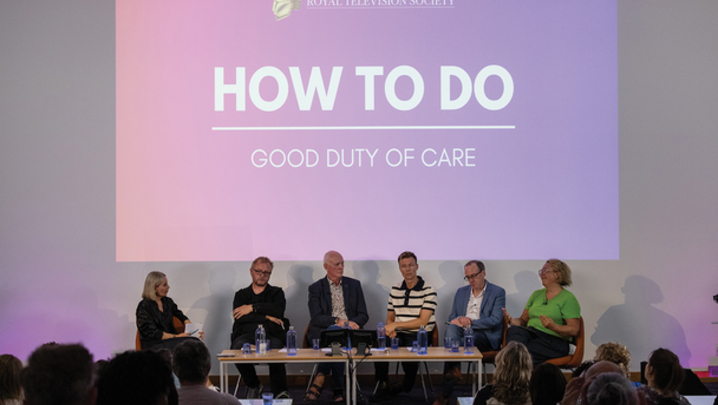Toby Jones and the creators of the Iraq war drama Danny Boy reveal their approach to making the BBC Two film at an RTS event.
In 2009, soldiers from the Argyll and Sutherland Highlanders and the Princess of Wales’s Royal Regiment found themselves the subject of a major inquiry into allegations of torture and the murder of Iraqi prisoners.
The inquiry lasted five gruelling years and eventually concluded that the allegations were untrue and “deliberate and calculated lies”. A decade after the story made headlines, the high-stakes investigation and the wider theme of morality in war is being dramatised in BBC Two’s Danny Boy through the eyes of one of the soldiers involved in the case, Brian Wood.
“When you’re bringing real, complex events to an audience, the most effective way in is through a singular perspective,” said executive producer Sue Horth, who was also behind the Bafta-winning dramatisation of Damilola Taylor’s story, Damilola, Our Beloved Boy.
Indeed, it was the storytelling technique that made Chernobyl so compelling, and brought home the message about systemic racism in the US in When They See Us.
Wood made an ideal conduit into the war and ensuing inquiry because his experience touched on key themes. “Imagine being a soldier who’s feted for their heroism, who is awarded a medal, and is then effectively accused of being a war criminal,” explained Horth. “How does that feel? At the same time, what are those split-second decisions taken in combat that are then scrutinised with the full glare of legal expertise after the event?
“The third component was that Brian comes from a family with a 300-years heritage of military service. So [having] that intimate family experience to explore those relationships of a father who’s also a soldier, and a son who’s questioning what he may or may not have done, felt really rare to us.”
A special story deserves special treatment, and so Expectation Entertainment’s drama airs as a 90-minute film, with Olivier award-winner Anthony Boyle (Ordeal by Innocence and *) in the lead role, and Toby Jones (Detectorists and Marvellous) as the soon-to-be-disgraced human rights solicitor, Phil Shiner.
Toby Jones joined Horth on the RTS panel with director Sam Miller and writer Robert Jones. Danny Boy was named after the battle that began this chain of events, explained the screenwriter. It started life as two 60-minute episodes, “but it just called out for being a one-off, and, in a way, that made a lot of editorial decisions for us. It helped to tell a punchier story.”
The team had reams of research on the Iraq war and the inquiry, plus source material in the form of Wood’s autobiography, Double Crossed: A Code of Honour, A Complete Betrayal. Even so, said Robert Jones, they felt forced to hone in on the emotional story at its heart, the story of “our characters, their lives and their families, rather than allowing the inquiry procedure to tell the story for us”.
As might be expected, he and the team consciously aimed to balance the truth of the real-life event with the cadence of a high-end drama, especially as Wood was involved in the production process.
“It’s not often in a drama like this that you have a key character who has the maturity and has done the work with himself that allows him to have that relationship with the project, and still be able to maintain some creative distance,” said Horth.
“We were aware that we were in some fairly cathartic moments for him,” added Miller. “As film-makers, we found telling some parts of Brian’s story quite emotional at times. He was totally at ease as we went into it, so it helped.”
To ensure that Wood was comfortable with Boyle’s depiction of him, the crew set up an hour-long meeting between the pair in the rehearsal rooms, which went so well that it ended up lasting all day.
Wood was also involved in the battle scenes to add authenticity, even down to giving advice on the way the soldiers wore their uniforms. “He would encourage Anthony to take his own beret home and shape it at home in his bathroom, so that it always fell at the right angle,” said Miller. “Those kinds of details gave Anthony so much confidence and he was hungry for all of that.”
As to the casting, the producers felt they struck lucky with both Anthony Boyle and Toby Jones. “Anthony was immediately interested in the ambiguities of the role,” said Horth. “His capacity to find those ambiguities exciting, even though they occur within a space of life and death, made him utterly compelling. We were obviously completely honoured to work with Toby as well. It’s a rare opportunity to get to work with the legendary Toby Jones.”
By coincidence, Jones’s wife is a barrister. It meant that she knew all about his character of Phil Shiner, and could help offer more context for his role. But Jones emphasised that it was his job to ignore Shiner’s reputation and follow the character that Robert had written instead.
“You’re not playing a real person, you’re playing a dramatist’s view of a real person,” he said. “My job is to humanise him, whether the audience thinks his choices right or wrong. I don’t have to have an opinion on all of that. I just have to portray him as clearly as I can.”
Production took place under Covid restrictions, with all the bubbling and the paring down of extras that this required. Iraq was recreated in a chalk quarry in Buckinghamshire.
“There were budgetary implications as to whether we ever could have gone abroad, but then, within the Covid framework, there was absolutely no way we could go to Morocco, Tenerife or wherever to seek that landscape,” said Miller. “And there were problems even if we did, because of the hardware we needed for the scenes. Even if you could find desert, would you necessarily find the military pieces that you needed to make those scenes?”
From the clips shown in the session, the end result suggests a show that’s sensitively brought to our screens while raising weighty questions about morals, war and momentary lapses of judgement.
“Our aim was never to veer too much to one side, not to tell too much of the soldier or too much of Phil Shiner’s legal position, but instead keep both those things open and live,” said Miller. “Because, in some ways, you can say both characters lost through this sequence. Brian had a very traumatic thing at the beginning, and then was taken through this process. And Shiner was barred at the end of this process, so he was really badly hurt.
“It’s a complex story. I hope that we’ve managed to entertain, but also shed light on it.”
Horth agrees: “Something that we thought about was to keep the audience in the present rather than applying our retrospective knowledge on to the storytelling.
“It’s valuable to be able to transport the audience so that they experience things as they unfold, and to not have the wisdom of hindsight. If our audience come away from the film more curious or asking more questions than they came to the film with, then I think we’ve done a good job.”
Report by Shilpa Ganatra. Journalist Emma Bullimore hosted an RTS Q&A with Toby Jones, Sam Miller, Robert Jones and Sue Horth on 28 April. Danny Boy airs on BBC Two and iPlayer at 9pm on 12 May.





